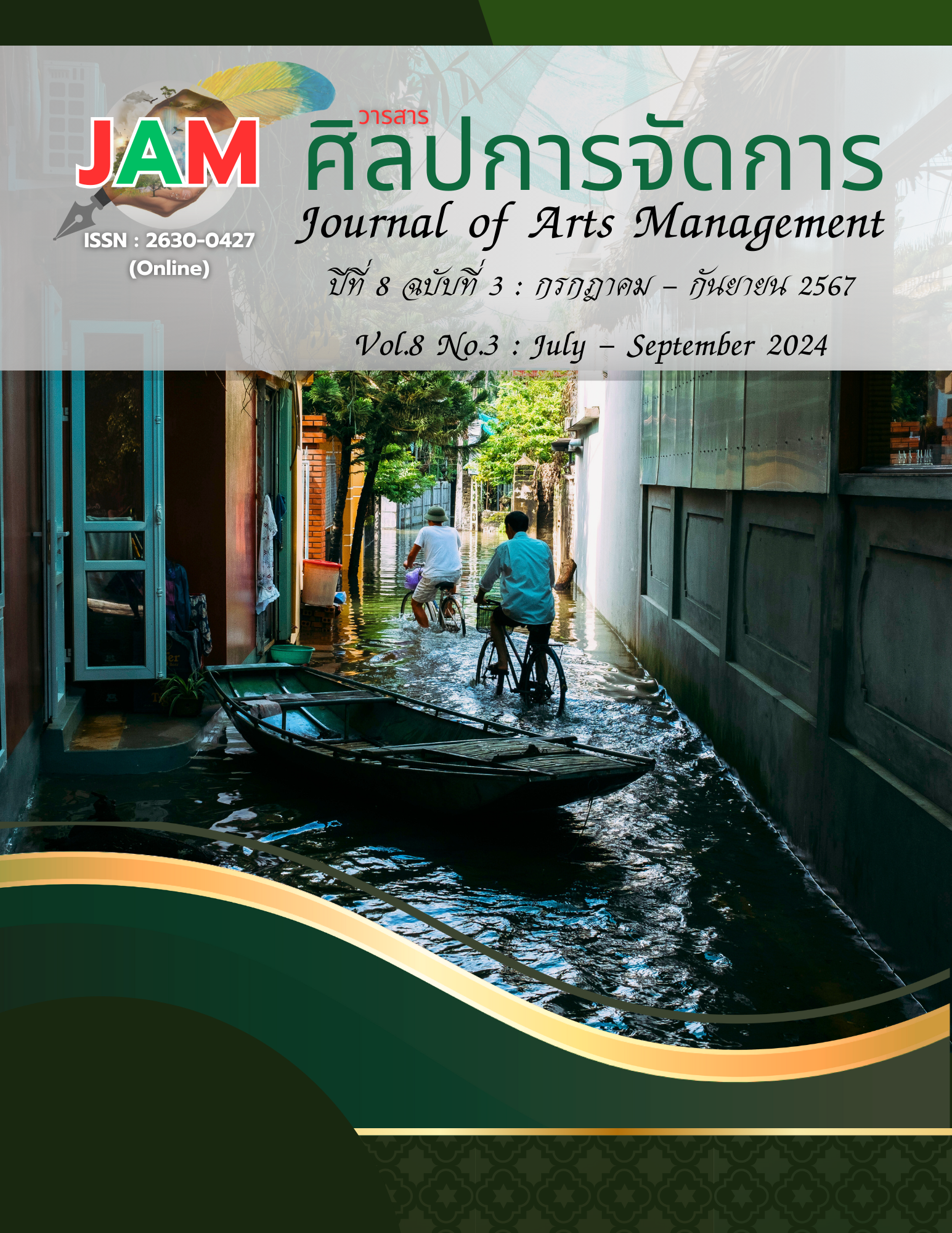Soft Power of Local Identity to Drive Community-based Tourism in Rai Khing Municipality as Creative Economy to Add Value and Sustainability
Main Article Content
Abstract
The objectives of this research article are 1) to study local identity in Rai Khing Municipality for community tourism, and 2) to develop the soft power of local identity to drive community-based tourism. Rai Khing Municipality According to the creative economy guideline, it is qualitative research. Semi-structured interviews were used to collect data. The main informants consist of 3 main groups to allow for data triangulation: (1) community leaders living in Rai Khing Municipality (2) officials working in Rai Khing Municipality (3) government officials, called key informants, who were specifically selected (purposive sampling), a total of 20 people with using content analysis as an analysis tool. The research results according to the research objectives were found. 1) Local identity in Rai Khing Municipality for community tourism consists of sustainable agricultural and conservation tourism, the reputation of pomelo, and large-scale pomelo marketing. The local folk museum is a heritage of wisdom reflecting the way of life of the local communities of the central region, people of various races who have settled in addition to Thai people, large-scale groups of farmers who grow pomelo or mixed agricultural products, and temples and local folk museums that have stories passed down from generation to generation. 2) Guidelines for developing the soft power of local identity to drive tourism by the community in Rai Khing Municipality according to the creative economy concept include resource management by producing organic agricultural products and local food; tourism format management by creating more modern tourism plans; and community tourism innovation by creating a network linking tourism routes from provinces, districts, and communities.
Article Details

This work is licensed under a Creative Commons Attribution-NonCommercial-NoDerivatives 4.0 International License.
Views and opinions appearing in articles in the Journal of Arts of Management It is the responsibility of the author of the article. and does not constitute the view and responsibility of the editorial team I agree that the article is copyright of the Arts and Management Journal.
References
Capital Administration and Management Unit for Increasing National Competitiveness (B.P.K.). (2021). Raise the level of the tourism sector with the concept of creative community tourism, community choice economic survival in the COVID-19 era. https://pmuc.or.th/
Erzberger, C., & Prein, G. (1997). Triangulation: Validity and empirically-based hypothesis construction. Quality & Quantity, 31, 141-154. https://doi.org/10.1023/A:1004249313062
Fontana, A., & Frey, J. H. (2008). The interview: From neutral stance to political involvement. In Denzin, N.K., & Lincoln Y.S. (Eds), The sage handbook of qualitative research (3rd ed.), 695-728. SAGE.
Hennink, M., Hutter, I., & Billey, A. (2011). Qualitative research methods. SAGE.
Intaprom, W. (2019). Analysis and presentation of qualitative data analysis. Academic Journal Phranakhon Rajabhat University, 10(2), 314-333. https://so01.tci-thaijo.org/index.php/AJPU/article/view/164379
Johnson, P., Buehring, A., Cassell, C., & Symon, G. (2006). Evaluating qualitative management research: Towards a contingent criteriology. International Journal of Management Reviews, 8(3), 131–156. DOI:10.1111/j.1468-2370.2006.00124.x
Maneeroj, N. (2017). Community based tourism management. Journal of International and Thai Tourism, 13(2), 25-46. https://so02.tci-thaijo.org/index.php/jitt/article/view/113060
Ministry of Culture. (2023). Soft Power Driving Plan with Cultural Dimensions to Develop the Thai Economy and Society (2023-2027). Ministry of Culture.
Nye, Jr. J. S. (2005). Soft power: The Means to Success in World Politics. Public Affairs Books.
Office of the National Economic and Social Development Council. (2023). National Economic and Social Development Plan No. 13. Transforming Thailand into a Progressive Society. The Economy Creates Sustainable Value. Prime Minister Office.
Office of the Permanent Secretary (2022). Strategic Plan for Driving white Tourism under the BCG Economic Model 2023 – 2027. Ministry of Tourism and Sports.
Phuangsuwan, P., Siripatthanakul, S., Praesri, S., Pariwongkhuntorn, N., & Khemapanya, V. (2024). Enhancing community economic sustainability based on cultural capital and local wisdom knowledge management: A case of Klong Maduea, Samut Sakhon. Journal of MCU Buddhapanya Review, 9(2), 1-13. https://so03.tci-thaijo.org/index.php/jmbr/article/view/269125
Phongnak, I. (2014). Identity of the ancient city of U Thong for the development of cultural tourism in Suphan Buri Province[Master’s thesis, Chulalongkorn University].
Rojrungsad, P. (2013). Community-based tourism. Odean Store.
Rudeeniyomwut, C. (2021). What is SOFT POWER? Soft power that isn't always soft mind-blowing power Capture the hearts of people around the world. https://www.brandthink.me/content/whatissoftpower
Saunder, M.N.K., Lewis, P., & Thronhill, A. (2019). Research methods for business students (8th ed.). Pearson.
Special Area Development Administration for Sustainable Tourism (Public Organization). (2016). Community-based tourism. Cocoon & Co.
Tourism Authority of Thailand. (2008). National Tourism Development Master Plan. Ministry of Tourism and Sports Development.
Wannaosote, W., & Pooripakdi, S. (2024). OTOP Nawatwithi community-based tourism management for sustainable community development. Journal of MCU Buddhapanya Review, 9(1), 217-227. https://so03.tci-thaijo.org/index.php/jmbr/article/view/261377


